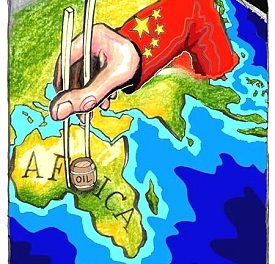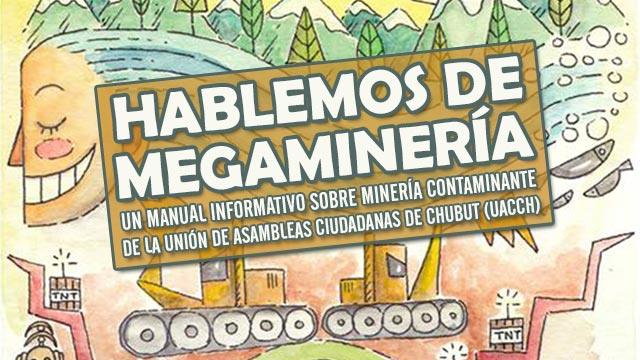 Multinationals like Canada’s Barrick Gold are making money hand over fist in mineral-rich South America. Proponents say the mines provide jobs and tax revenue. Many local communities, however, oppose the mega-projects on environmental grounds. By Chrystelle Barbier and Christine Legrand LE MONDE/Worldcrunch
Multinationals like Canada’s Barrick Gold are making money hand over fist in mineral-rich South America. Proponents say the mines provide jobs and tax revenue. Many local communities, however, oppose the mega-projects on environmental grounds. By Chrystelle Barbier and Christine Legrand LE MONDE/Worldcrunch
LIMA/BUENOS AIRES — In Catamarca, one of Argentina’s poorest provinces, residents are on the war path. For several weeks now, hundreds of protestors have barricaded routes near the town of Belén to oppose efforts by the multinationals Xtrata and Barrick Gold to expand production of a nearby open-pit mine called La Alumbrera.
In the neighboring province of La Rioja, residents are targeting another project, the Famatina mine, owned by the Canadian firm Osisko Mining Corporation.
“Water is more precious than gold,” is the battle cry being raised throughout Latin America by anti-mining groups that include rural peasants, ecologists and scientists. Together they complain of the negative environmental and social impacts caused by open-pit mines, which make heavy use of explosives, cyanide and fresh water. La Alumbrera consumes between 60 and 100 million liters of water per day.
In Peru, thousands of people descended upon Lima in early February for a “national march” to protest the expansion of mining concessions throughout the country. Participants say the mines threaten their local water supplies. The biggest single source of controversy is a $4.8-billion mine project called Conga, which risks emptying several lakes in the northern department of Cajamarca.
In recent years, rising prices for gold, copper and other metals have accelerated the global rush for South America’s considerable mineral resources. Between 2003 and 2006, gold production soared 6,000% in Argentina. And in Peru, the world’s leading silver producer, mining exports established a new all-time record in 2011, pulling in $27.46 billion – equivalent to 59% of the country’s total export earnings.
An unmatched source of revenue, the mining sector is held in great esteem by the region’s governments, which view it is an economic windfall. Many experts, however, say that mines like La Alumbrera are only modestly beneficial for their host countries. The lion’s share of the wealth, they say, goes into the pockets of multinationals. Such projects do create employment opportunities, but mostly during their initial construction phase. Once the mines are up and running, the number of jobs they provide is relatively small.
Choosing between work and health
What are now dubbed “social-environmental” conflicts are a widespread occurrence in Peru. A case in point is occurring in the city of Oroya, tucked away in the Peruvian Andes roughly 180 kilometers northeast of Lima. There, some 33,000 residents are opposing plans by a firm called Doe Run Peru to resume mining activities that were halted in 2009 for economic reasons.
“The people want to work,” says Emma Gomez of the NGO called Cooperacción. In this case, however, people are being forced to choose “between the right to work and the right to good health,” she complains. According to Cooperacción, many of the region’s residents suffer respiratory problems. Studies have also turned up higher than normal lead levels in blood samples taken from area children.
Another major source of controversy is Pascua Lama, a massive gold mine that hugs the border between Chile and Argentina. Environmentalists complain that the mine will severely damage glaciers on both sides of Andes mountain range. Residents in the valleys below, according to Argentine biologist Raul Montenegro, “depend on the fresh water provided by these glaciers for the farming activities, for their very lives.”
Nevertheless, the $1.5 billion project – owned by Canada’s Barrick Gold – enjoys implicit support from the Argentine government. It received a big boost in 2008 when President Cristina Kirchner vetoed a proposed glacier protection law that would have limited mining and oil production in protected zones.
Kirchner and other South American leaders tend to favor major foreign investment opportunities over local environmental concerns. Critics note that the environmental impact reports required for many of these large products are often carried out by the multinational companies themselves.
The mining companies also enjoy legal “immunity,” says Antonio Gomez, a federal prosecutor for the Argentina mining provinces of Catamarca, Santiago del Estero and Tucuman. “Their pollution offenses are ignored.”
Peruvian President Ollanta Humala promotes “responsible mining,” insisting that farming and mining projects can coexist. His ideas, however, don’t tend to resonate with local communities, which accuse multinationals of trampling on their rights and polluting their resources.
In Peru, a “prior consultation law” was established last September, but has yet to go into effect. Similar laws exist – but aren’t applied – in Argentina, Bolivia, Chile and Ecuador.











